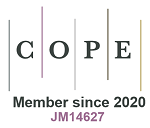Eco-Innovation and SME Performance in Time of Covid-19 Pandemic: Moderating Role of Environmental Collaboration
Abstract
Objectives: All businesses worldwide, especially small and medium-sized organizations, are now concerned about environmental degradation. Eco-innovation and environmental collaboration are expected to be the driving forces for saving the environment and the performance of companies. Therefore, this study aimed to ascertain how eco-innovation and environmental cooperation affect the financial, social, and environmental performance of SMEs. This study also explored environmental collaboration as a moderating variable for the effect of eco-innovation on the performance of SMEs. Methods/Analysis: Data from 300 small and medium-sized enterprises of Creative Home Décor were analyzed using structural equation modeling. Findings: Eco-innovation is necessary to improve the performance of Indonesia's SMEs. Environmental collaboration has a beneficial and substantial effect on the performance of the environment and society. Regarding environmental collaboration as a moderating variable, this study identified a positive and statistically significant coefficient regulating the relationship between financial performance and eco-innovation. Novelty /Improvement. The novelty of this research lies in its focus on the impact of eco-innovation and environmental collaboration on the performance of SMEs, particularly in developing countries such as Indonesia, during the COVID-19 pandemic. The study also contributed to the theoretical and empirical understanding of eco-innovation in developing countries and highlighted the importance of environmental collaboration in enhancing the social and environmental performance of SMEs. Additionally, this paper provided empirical and theoretical contributions on the role of environmental collaboration as a moderating variable that is particularly improving the performance of Indonesia's SMEs in Creative Home Décor during the COVID-19 pandemic.
JEL Classifications: M12, L68, L25, L53, Q56
Doi: 10.28991/ESJ-2023-SPER-018
Full Text: PDF
Keywords
References
Janahi, N. A., Durugbo, C. M., & Al-Jayyousi, O. R. (2021). Eco-innovation strategy in manufacturing: A systematic review. Cleaner Engineering and Technology, 5, 100343. doi:10.1016/j.clet.2021.100343.
Laperche, B., & Picard, F. (2013). Environmental constraints, Product-Service Systems development and impacts on innovation management: Learning from manufacturing firms in the French context. Journal of Cleaner Production, 53, 118–128. doi:10.1016/j.jclepro.2013.03.047.
Kasztelan, A., Kijek, T., Kijek, A., & Kierepka-Kasztelan, A. (2020). Are Eco-Innovations a Key Element for Green Growth? European Research Studies Journal, XXIII(Issue 2), 624–643. doi:10.35808/ersj/1613.
Hermundsdottir, F., & Aspelund, A. (2021). Sustainability innovations and firm competitiveness: A review. Journal of Cleaner Production, 280, 124715. doi:10.1016/j.jclepro.2020.124715.
Silvestre, B. S., & Ţîrcă, D. M. (2019). Innovations for sustainable development: Moving toward a sustainable future. Journal of Cleaner Production, 208, 325–332. doi:10.1016/j.jclepro.2018.09.244.
Guo, J., Chen, M., Sun, X., Wang, Z., & Xue, J. (2020). Leveraging industrial-technological innovation to achieve sustainable development: A systems thinking perspective. PLOS ONE, 15(12), e0242981. doi:10.1371/journal.pone.0242981.
Sanchez-Henriquez, F., & Pavez, I. (2021). The Effect of Open Innovation on Eco-Innovation Performance: The Role of Market Knowledge Sources. Sustainability, 13(7), 3890. doi:10.3390/su13073890.
Adomako, S., & Tran, M. D. (2022). Environmental collaboration, responsible innovation, and firm performance: The moderating role of stakeholder pressure. Business Strategy and the Environment, 31(4), 1695–1704. doi:10.1002/bse.2977.
Grekova, K., Calantone, R. J., Bremmers, H. J., Trienekens, J. H., & Omta, S. W. F. (2016). How environmental collaboration with suppliers and customers influences firm performance: Evidence from Dutch food and beverage processors. Journal of Cleaner Production, 112, 1861–1871. doi:10.1016/j.jclepro.2015.03.022.
Das, M., Rangarajan, K., & Dutta, G. (2020). Corporate sustainability in SMEs: an Asian perspective. Journal of Asia Business Studies, 14(1), 109–138. doi:10.1108/JABS-10-2017-0176.
Maria, S., Yudaruddin, R., & Yudaruddin, Y. A. (2022). The impact of COVID-19 on bank stability: Do bank size and ownership matter? Banks and Bank Systems, 17(2), 124–137. doi:10.21511/bbs.17(2).2022.11.
6-Riadi, S. S., Hadjaat, M., & Yudaruddin, R. (2022). Bank Concentration and Bank Stability during the COVID-19 Pandemic. Emerging Science Journal, 6, 262–274. doi:10.28991/esj-2022-sper-018.
7-Yudaruddin, R. (2022). Bank lending during the COVID-19 pandemic: do alliances and digital strategies matter? Managerial Finance. doi:10.1108/MF-04-2022-0167.
8-Riadi, S. S., Heksarini, A., Lestari, D., Maria, S., Zainurossalamia, S., & Yudaruddin, R. (2022). The Benefits of e-Commerce before and during the Covid-19 Pandemic for Small Enterprises in Indonesia. WSEAS Transactions on Environment and Development, 18, 69–79. doi:10.37394/232015.2022.18.8.
Lestari, D., Zainurossalamia ZA, S., Maria, S., Wardhani, W., & Yudaruddin, R. (2021). The impact of COVID-19 pandemic on performance of small enterprises that are e-commerce adopters and non-adopters. Problems and Perspectives in Management, 19(3), 467–477. doi:10.21511/ppm.19(3).2021.38.
Ulfah, Y., Ambarita, N. P., Hidayani, Yudaruddin, R., & Lesmana, D. (2022). Board Structure and Earning Management: a Comparative Study Between the Pre-Pandemic and During the Covid-19 Pandemic Periods. Corporate and Business Strategy Review, 3(2), 177–187. doi:10.22495/cbsrv3i2art16.
Zainurossalamia ZA, S., Martiyanti, D., Noorlitaria Achmad, G., Lesmana, D., & Yudaruddin, R. (2022). Impact of operational activities on customer satisfaction in cafes and restaurants: A mediating role of infrastructural elements. Innovative Marketing, 18(4), 13–24. doi:10.21511/im.18(4).2022.02.
Lestari, D., Lesmana, D., Yudaruddin, Y. A., & Yudaruddin, R. (2022). The impact of financial development and corruption on foreign direct investment in developing countries. Investment Management and Financial Innovations, 19(2), 211–220. doi:10.21511/imfi.19(2).2022.18.
Musviyanti, Khairin, F. N., Bone, H., Syakura, M. A., & Yudaruddin, R. (2022). Structure of local government budgets and local fiscal autonomy: Evidence from Indonesia. Public and Municipal Finance, 11(1), 79–89. doi:10.21511/pmf.11(1).2022.07.
Defung, F., & Yudaruddin, R. (2022). Economic freedom on bank stability and risk-taking in emerging economy: Indonesian case study. Cogent Business & Management, 9(1). doi:10.1080/23311975.2022.2112816.
Boyd, B. K., Dess, G. G., & Rasheed, A. M. A. (1993). Divergence between Archival and Perceptual Measures of the Environment: Causes and Consequences. The Academy of Management Review, 18(2), 204. doi:10.2307/258758.
Drazin, R., & de Ven, A. H. V. (1985). Alternative Forms of Fit in Contingency Theory. Administrative Science Quarterly, 30(4), 514. doi:10.2307/2392695.
Wernerfelt, B. (1984). A resource-based view of the firm. Strategic Management Journal, 5(2), 171–180. doi:10.1002/smj.4250050207.
Johl, S. K., & Toha, M. A. (2021). The nexus between proactive eco‐innovation and firm financial performance: a circular economy perspective. Sustainability (Switzerland), 13(11), 6253. doi:10.3390/su13116253.
Triguero, A., Moreno-Mondéjar, L., & Davia, M. A. (2013). Drivers of different types of eco-innovation in European SMEs. Ecological Economics, 92, 25–33. doi:10.1016/j.ecolecon.2013.04.009.
Horbach, J. (2008). Determinants of environmental innovation-New evidence from German panel data sources. Research Policy, 37(1), 163–173. doi:10.1016/j.respol.2007.08.006.
Díaz-García, C., González-Moreno, Á., & Sáez-Martínez, F. J. (2015). Eco-innovation: insights from a literature review. Innovation, 17(1), 6–23. doi:10.1080/14479338.2015.1011060.
Cheng, C. C. J., Yang, C. L., & Sheu, C. (2014). The link between eco-innovation and business performance: A Taiwanese industry context. Journal of Cleaner Production, 64, 81–90. doi:10.1016/j.jclepro.2013.09.050.
Dangelico, R. M. (2016). Green Product Innovation: Where we are and Where we are Going. Business Strategy and the Environment, 25(8), 560–576. doi:10.1002/bse.1886.
Ali, W., Wen, J., Hussain, H., Khan, N. A., Younas, M. W., & Jamil, I. (2021). Does green intellectual capital matter for green innovation adoption? Evidence from the manufacturing SMEs of Pakistan. Journal of Intellectual Capital, 22(5), 868–888. doi:10.1108/JIC-06-2020-0204.
Cainelli, G., De Marchi, V., & Grandinetti, R. (2015). Does the development of environmental innovation require different resources? Evidence from Spanish manufacturing firms. Journal of Cleaner Production, 94, 211–220. doi:10.1016/j.jclepro.2015.02.008.
Kemp, R., & Oltra, V. (2011). Research Insights and Challenges on Eco-Innovation Dynamics. Industry & Innovation, 18(3), 249–253. doi:10.1080/13662716.2011.562399.
Organisation for Economic Co-operation and Development (OEDC). (2005). Oslo manual: Guidelines for collecting and interpreting innovation data (3rd Ed). OECD Publishing, Paris, France. doi:10.1787/9789264013100-en.
del Río, P., Carrillo-Hermosilla, J., & Könnölä, T. (2010). Policy strategies to promote eco-innovation: An integrated framewor. Journal of Industrial Ecology, 14(4), 541–557. doi:10.1111/j.1530-9290.2010.00259.x.
Mulaessa, N., & Lin, L. (2021). How do proactive environmental strategies affect green innovation? The moderating role of environmental regulations and firm performance. International Journal of Environmental Research and Public Health, 18(17), 9083. doi:10.3390/ijerph18179083.
Araújo, R., & Franco, M. (2021). The use of collaboration networks in search of eco-innovation: A systematic literature review. Journal of Cleaner Production, 314, 1–14. doi:10.1016/j.jclepro.2021.127975.
Alraja, M. N., Imran, R., Khashab, B. M., & Shah, M. (2022). Technological Innovation, Sustainable Green Practices and SMEs Sustainable Performance in Times of Crisis (COVID-19 pandemic). Information Systems Frontiers, 24(4), 1081–1105. doi:10.1007/s10796-022-10250-z.
Barriga Medina, H. R., Guevara, R., Campoverde, R. E., & Paredes-Aguirre, M. I. (2022). Eco-Innovation and Firm Performance: Evidence from South America. Sustainability (Switzerland), 14(15), 9579. doi:10.3390/su14159579.
Hizarci-Payne, A. K., İpek, İ., & Kurt Gümüş, G. (2021). How environmental innovation influences firm performance: A meta-analytic review. Business Strategy and the Environment, 30(2), 1174–1190. doi:10.1002/bse.2678.
de Oliveira Brasil, M. V., Sá de Abreu, M. C., da Silva Filho, J. C. L., & Leocádio, A. L. (2016). Relationship between eco-innovations and the impact on business performance: an empirical survey research on the Brazilian textile industry. Revista de Administração, 51(3), 276–287. doi:10.1016/j.rausp.2016.06.003.
Zhang, D., Rong, Z., & Ji, Q. (2019). Green innovation and firm performance: Evidence from listed companies in China. Resources, Conservation and Recycling, 144, 48–55. doi:10.1016/j.resconrec.2019.01.023.
Latupeirissa, G., & Adhariani, D. (2020). External and internal economic impacts of eco-innovation and the role of political connections: A sustainability narrative from an emerging market. Journal of Cleaner Production, 258, 120579. doi:10.1016/j.jclepro.2020.120579.
Fernando, Y., Shaharudin, M. S., & Wahid, N. A. (2016). Eco-innovation practices: A case study of green furniture manufacturers in Indonesia. International Journal of Services and Operations Management, 23(1), 43–58. doi:10.1504/IJSOM.2016.073289.
Susilawati, D., & Kanowski, P. (2020). Cleaner production in the Indonesian pulp and paper sector: Improving sustainability and legality compliance in the value chain. Journal of Cleaner Production, 248, 119259. doi:10.1016/j.jclepro.2019.119259.
Geng, D., Lai, K., & Zhu, Q. (2021). Eco-innovation and its role for performance improvement among Chinese small and medium-sized manufacturing enterprises. International Journal of Production Economics, 231, 107869. doi:10.1016/j.ijpe.2020.107869.
Zubeltzu-Jaka, E., Erauskin-Tolosa, A., & Heras-Saizarbitoria, I. (2018). Shedding light on the determinants of eco-innovation: A meta-analytic study. Business Strategy and the Environment, 27(7), 1093–1103. doi:10.1002/bse.2054.
Ben Arfi, W., Hikkerova, L., & Sahut, J. M. (2018). External knowledge sources, green innovation and performance. Technological Forecasting and Social Change, 129, 210–220. doi:10.1016/j.techfore.2017.09.017.
Mahmud, M., Soetanto, D., & Jack, S. (2021). A contingency theory perspective of environmental management: Empirical evidence from entrepreneurial firms. Journal of General Management, 47(1), 3–17. doi:10.1177/0306307021991489.
Almeida, F., & Wasim, J. (2023). Eco-innovation and sustainable business performance: perspectives of SMEs in Portugal and the UK. Society and Business Review, 18(1), 28–50. doi:10.1108/SBR-12-2021-0233.
Zulkiffli, S. N. A., Zaidi, N. F. Z., Padlee, S. F., & Sukri, N. K. A. (2022). Eco-Innovation Capabilities and Sustainable Business Performance during the COVID-19 Pandemic. Sustainability, 14, 7525. doi:10.3390/su14137525.
Ahmed, W., Najmi, A., Arif, M., & Younus, M. (2019). Exploring firm performance by institutional pressures driven green supply chain management practices. Smart and Sustainable Built Environment, 8(5), 415–437. doi:10.1108/SASBE-04-2018-0022.
Hollos, D., Blome, C., & Foerstl, K. (2012). Does sustainable supplier co-operation affect performance? Examining implications for the triple bottom line. International Journal of Production Research, 50(11), 2968–2986. doi:10.1080/00207543.2011.582184.
Voegtlin, C., & Scherer, A. G. (2017). Responsible Innovation and the Innovation of Responsibility: Governing Sustainable Development in a Globalized World. Journal of Business Ethics, 143(2), 227–243. doi:10.1007/s10551-015-2769-z.
Laari, S., Töyli, J., Solakivi, T., & Ojala, L. (2016). Firm performance and customer-driven green supply chain management. Journal of Cleaner Production, 112(3), 1960–1970. doi:10.1016/j.jclepro.2015.06.150.
Tachizawa, E. M., Gimenez, C., & Sierra, V. (2015). Green supply chain management approaches: drivers and performance implications. International Journal of Operations and Production Management, 35(11), 1546–1566. doi:10.1108/IJOPM-01-2015-0023.
Ahmed, W., Ashraf, M. S., Khan, S. A., Kusi-Sarpong, S., Arhin, F. K., Kusi-Sarpong, H., & Najmi, A. (2020). Analyzing the impact of environmental collaboration among supply chain stakeholders on a firm’s sustainable performance. Operations Management Research, 13(1–2), 4–21. doi:10.1007/s12063-020-00152-1.
Vu, T. T., & Dang, W. V. T. (2021). Environmental commitment and firm financial performance: a moderated mediation study of environmental collaboration with suppliers and CEO gender. International Journal of Ethics and Systems, 37(1), 53–69. doi:10.1108/IJOES-02-2020-0015.
Arora, A., Arora, A. S., Sivakumar, K., & Burke, G. (2020). Strategic sustainable purchasing, environmental collaboration, and organizational sustainability performance: the moderating role of supply base size. Supply Chain Management, 25(6), 709–728. doi:10.1108/SCM-07-2019-0284.
Hair, J. F., Hult, G. T. M., Ringle, C. M., Sarstedt, M., Danks, N. P., & Ray, S. (2021). Partial Least Squares Structural Equation Modeling (PLS-SEM) Using R. Classroom Companion: Business, Springer, Cham, Switzerland. doi:10.1007/978-3-030-80519-7.
DOI: 10.28991/ESJ-2023-SPER-018
Refbacks
- There are currently no refbacks.
Copyright (c) 2022 rizky yudaruddin







